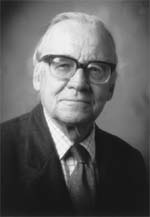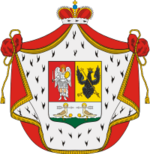| Sir Dimitri Obolensky | |
|---|---|
| Дмитрий Оболенский | |
 | |
| Born | Prince Dmitri Dmitrievich Obolensky 1 April 1918 St Petersburg, Russian Soviet Republic |
| Died | 23 December 2001(2001-12-23) (aged 83) Burford, Oxfordshire |
| Nationality | Russian |
| Citizenship | United Kingdom |
| Awards | |
| Academic background | |
| Alma mater | Trinity College, Cambridge (1937–42) |
| Thesis | The Bogomils: A Study in Balkan Neo-Manichaeism (1942) |
| Doctoral advisor | Elizabeth Hill |
| Influences | Francis Dvornik, Ihor Ševčenko, John Meyendorff |
| Academic work | |
| Institutions |
|
| Doctoral students | Anthony Bryer, Michael Angold, James Howard-Johnston, Jonathan Shepard, Simon Franklin |
| Notable works | The Byzantine Commonwealth: Eastern Europe, 500–1453 |
| Notable ideas | Byzantine commonwealth |
Sir Dimitri Dimitrievich Obolensky FBA FSA (Russian: Дмитрий Дмитриевич Оболенский; 1 April [O.S. 19 March] 1918 – 23 December 2001) was a Russian-British historian who was Professor of Russian and Balkan History at the University of Oxford and the author of various historical works.
Biography

Prince Dimitri Dimitrievich Obolensky was born in the Russian Soviet Republic on 1 April 1918 in Saint Petersburg, the son of Prince Dimitri Alexandrovich Obolensky (1882–1964) and Countess Maria (Shuvalova) (1894–1973). His family was descended from Rurik, Igor, Svyatoslav, St Vladimir of Kiev, St Michael of Chernigov, and Prince Mikhail Semyonovich Vorontsov: however, as one of his students has written, "he was a sober enough scholar to know that Rurik may not actually have existed."
After the Russian Revolution, the Royal Navy helped the Obolensky family to escape from Russia in 1919, together with the Dowager Empress Marie Feodorovna and the Grand Duke Nicholas. He was educated in Britain at Lynchmere Preparatory School, Eastbourne, and in France at the Lycée Pasteur in Neuilly-sur-Seine, before going up to Trinity College, Cambridge, where he distinguished himself with a Blue for lawn tennis and graduated in 1940.
Obolensky became a distinguished academic. He was elected a Fellow of Trinity College (1942–1948, Honorary Fellow 1991–2001) and Lecturer in Slavonic Studies, University of Cambridge (1946–1948). He became a British national in 1948.
From 1949 to 1961, Obolensky was Reader in Russian and Balkan Medieval History at the University of Oxford (1949–1961) and subsequently Professor of Russian and Balkan History (1961–1985, Emeritus 1985–2001). He was also a Student of Christ Church, Oxford (1950–1985, Emeritus 1985–2001). He later became Vice-President of the Keston Institute, Oxford.
Obolensky's most enduring achievement was The Byzantine Commonwealth (1971), a large-scale synthesis on the cultural influence of the Eastern Roman Empire. Other major studies include The Bogomils: a study in Balkan neo-Manichaeism (1946) and Six Byzantine Portraits (1988).
Obolensky was elected a Fellow of the British Academy (1974, Vice-President 1983–85), as well as Fellow of the Society of Antiquaries, and appointed a Knight Bachelor (1984). He was a member of the Athenaeum Club. In 1988, he returned to Russia as a delegate to the Sobor or Council of the Russian Orthodox Church convoked to celebrate the 1,000th anniversary of the conversion of Russia to Christianity. He was elected to the American Philosophical Society in 1990.
Obolensky married Elisabeth Lopukhin in 1947; they had no children, and the marriage was dissolved in 1989.
Sir Dimitri died on 23 December 2001 at Burford in Oxfordshire. His memorial service was held in Christ Church Cathedral, Oxford, and he is buried at Wolvercote Cemetery.

Selected works
- Obolensky, Dimitri (1971). Byzantium and the Slavs: Collected Studies. London: Variorum Reprints. ISBN 978-0-902089-14-3.
- Obolensky, Dimitri (1974) . The Byzantine Commonwealth: Eastern Europe, 500-1453. London: Cardinal. ISBN 9780351176449.
- Obolensky, Dimitri (1982). The Byzantine Inheritance of Eastern Europe. London: Variorum Reprints. ISBN 9780860781028.
- Obolensky, Dimitri (1988). Six Byzantine Portraits. Clarendon Press. ISBN 9780198219514.
- Obolensky, Dimitri (2004) . The Bogomils: A Study in Balkan Neo-Manichaeism. Cambridge University Press. ISBN 9780521607636.
- Obolensky, Dimitri (1971). Bread of Exile: A Russian Family. Harvill Press. ISBN 1-86046-511-0.
Notes
- ^ Shepard, Jonathan (2004). "Dimitri Dimitrievich Obolensky 1918–2001" (PDF). The British Academy.
- S. Franklin, "Sir Dimitri Obolensky," Proceedings of the American Philosophical Society 148 (2004), 140, www.amphilsoc.org Archived 9 August 2017 at the Wayback Machine
- "Professor Sir Dimitri Obolensky". The Telegraph. 7 January 2002.
- ^ "Sir Dimitri Obolensky". The Guardian. 4 January 2002.
- ^ Bryer, Anthony (31 December 2001). "Obituary: Professor Sir Dimitri Obolensky". The Independent.
- "APS Member History". search.amphilsoc.org. Retrieved 14 April 2022.
External links
- Robin Milner-Gulland, 'Professor Sir Dimitri Obolensky, 1918-2002', Society for the Promotion of Byzantine Studies
- Burke's Peerage, Baronetage & Knightage
- 1918 births
- 2001 deaths
- Burials at Wolvercote Cemetery
- Obolensky family
- Fellows of Christ Church, Oxford
- Alumni of Trinity College, Cambridge
- Fellows of Trinity College, Cambridge
- Fellows of the British Academy
- Historians of Russia
- British historians of religion
- Historians of Europe
- British Byzantinists
- British medievalists
- Knights Bachelor
- White Russian emigrants to the United Kingdom
- Fellows of the Society of Antiquaries of London
- Lycée Pasteur (Neuilly-sur-Seine) alumni
- Foreign members of the Russian Academy of Sciences
- 20th-century British historians
- British expatriates in France
- Scholars of Byzantine history
- Members of the American Philosophical Society